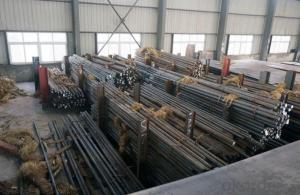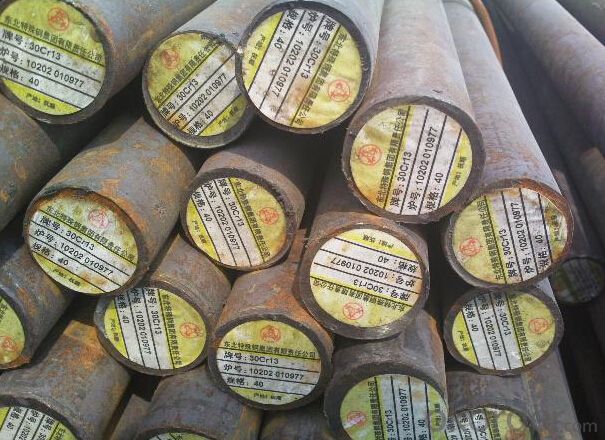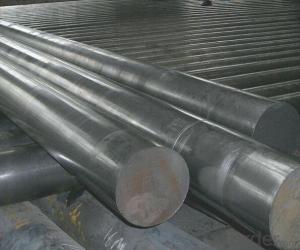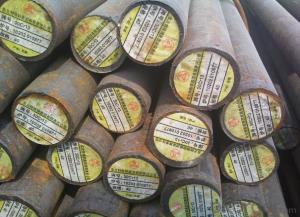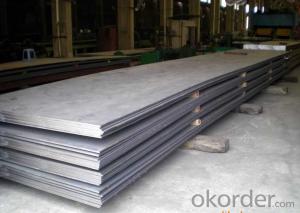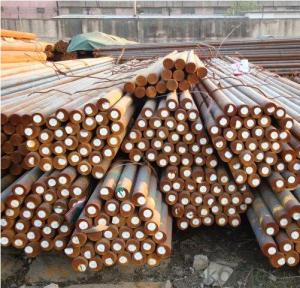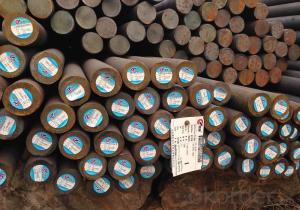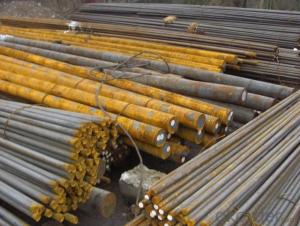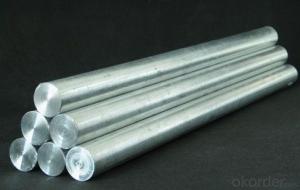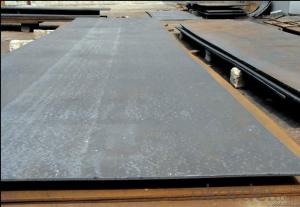Special Steel DIN 1.2601 High Carbon Steel
- Loading Port:
- China main port
- Payment Terms:
- TT or LC
- Min Order Qty:
- 25 m.t.
- Supply Capability:
- 10000 m.t./month
OKorder Service Pledge
OKorder Financial Service
You Might Also Like
Specification
The details of our Steel
1. Produce Standard: as the GB, AISI, ASTM, SAE, EN, BS, DIN, JIS Industry Standard
2. Produce processes: Smelt Iron -EAF smelt Billet - ESR smelt Billet -Hot rolled or forged get the steel round bar and plate
3. Heat treatment:
Normalized / Annealed / Quenched+Tempered
4. Quality assurance:
All order we can received Third party inspection, You can let SGS, BV,.. and others test company test and inspect our products before Goods shipping.
Product information
Chemical Composition(%)
Country | Standard | C | Si | Mn | Cr | Mo | V | S | P | W |
GB | C12MoV | 1.45-1.70 | ≤0.40 | ≤0.40 | 11.00-12.5 | 0.40-0.60 | 0.15-0.30 | ≤0.030 | ≤0.030 | |
DIN | 1.2601 | 1.55-1.75 | 0.25-0.40 | 0.20-0.40 | 11.00-12.0 | 0.50-0.70 | 0.10-0.50 | ≤0.030 | ≤0.030 | 0.40-0.60 |
Available Size
Rolled flat steel | 12-90mm×205-610mm×L |
Forged flat steel | 100-300mm×400-600mm×L |
Heat Treatment
Item | Temperature℃ | Hardness |
Anneal | 850-880 | ≤255HB |
Quenching | No.1:980-1040 | 60-63HRC |
No.2:1050-1130 | 42-50HRC | |
Tempering | No.1:200-300(1) | 57-60HRC |
No.2:200-300(2-3) | 58-62HRC |
Characterstics
1.High hardening ability and abrasion resistance | ||||||||
2.Less quenching deformation | ||||||||
3.Higher toughness and more homogeneous carbide distribution than Cr12 steel |
Applications: Suitable for various complicated cold working dies with high precision and long lifetime,such as punching dies,cold extrusion dies,thread rolling dies,screw plates,cold extrusion dies,and precise measuring devices
Product show

Workshop show

- Q: What are the different welding techniques used for special steel?
- Some of the different welding techniques used for special steel include TIG (Tungsten Inert Gas) welding, MIG (Metal Inert Gas) welding, and submerged arc welding. TIG welding is commonly used for stainless steel and allows for precise control and high-quality welds. MIG welding is versatile and can be used for a wide range of steel types, including special steel, providing fast and efficient welds. Submerged arc welding is used for thicker sections of special steel and offers excellent penetration and deposition rates.
- Q: How does special steel contribute to the energy industry?
- Special steel contributes to the energy industry in various ways. It is widely used in the manufacturing of turbines, generators, and other critical components for power plants. Its high strength, durability, and corrosion resistance properties make it suitable for withstanding the extreme conditions found in power generation facilities. Additionally, special steel plays a crucial role in the production of pipelines and storage tanks for the oil and gas sector, ensuring the safe and efficient transportation and storage of energy resources. Overall, special steel enhances the reliability and efficiency of energy infrastructure, supporting the growth and sustainability of the energy industry.
- Q: How does special steel contribute to the durability of products?
- Special steel contributes to the durability of products in several ways. Firstly, special steel is known for its high strength and hardness, making it resistant to wear and tear. This ensures that products made from special steel can withstand heavy use and last longer than those made from regular steel or other materials. Additionally, special steel is often alloyed with other elements such as chromium, nickel, and molybdenum, which enhances its corrosion resistance. This is particularly important for products that are exposed to harsh environments or chemicals. The corrosion resistance of special steel helps prevent rust and degradation, increasing the lifespan of the product. Furthermore, special steel can be heat-treated to improve its mechanical properties, such as toughness and hardness. Heat-treated special steel undergoes specific heating and cooling processes to enhance its strength, making it less prone to deformation and breakage. This is particularly beneficial for products that are subject to heavy loads or impacts. Moreover, special steel is often manufactured with precise composition and microstructure, which results in improved material properties. This includes better fatigue resistance, meaning the material can withstand repeated stress without cracking or breaking. Products made from special steel are therefore more reliable and less prone to failure. In summary, special steel contributes to the durability of products through its high strength, corrosion resistance, improved mechanical properties, and better fatigue resistance. By utilizing special steel in the manufacturing process, products can be designed to withstand various demanding conditions, ensuring a longer lifespan and greater reliability.
- Q: How does special steel contribute to the manufacturing of medical implants?
- The unique properties and characteristics of special steel make it vital in the production of medical implants. These implants need materials that are durable, corrosion-resistant, and biocompatible. Stainless steel, titanium alloys, and cobalt-chromium alloys are special steels that possess these desired qualities, making them ideal for medical implant manufacturing. Stainless steel, for instance, is widely used in the production of medical implants due to its exceptional corrosion resistance and high strength. It finds applications in surgical instruments, orthopedic implants, and dental devices. Stainless steel implants can endure the harsh physiological conditions within the body, ensuring long-term performance and reducing the risk of complications. Titanium alloys, on the other hand, are extensively utilized in medical implant manufacturing. These alloys offer a high strength-to-weight ratio, excellent biocompatibility, and corrosion resistance. Orthopedic surgeries, including joint replacements, as well as dental implants, commonly employ titanium implants. The biocompatible nature of titanium allows for better integration with the surrounding bone, facilitating faster healing and reducing the risk of rejection. Cobalt-chromium alloys are also utilized in the production of medical implants. These alloys possess outstanding mechanical strength, wear resistance, and biocompatibility. Orthopedic surgeries and cardiovascular interventions, such as stents, often make use of cobalt-chromium implants. Their high strength ensures stability and durability, while their biocompatibility minimizes adverse reactions and aids in patient recovery. Overall, special steel provides the necessary qualities for manufacturing medical implants. Whether it is stainless steel, titanium alloys, or cobalt-chromium alloys, these materials contribute to the creation of biocompatible, corrosion-resistant, and durable implants that enhance patients' quality of life and ensure successful medical procedures.
- Q: How does the composition of special steel affect its mechanical properties?
- The composition of special steel plays a significant role in determining its mechanical properties. Special steel refers to a type of steel that has been modified or alloyed with other elements to enhance its strength, toughness, hardness, and other desirable properties. The addition of various alloying elements, such as manganese, chromium, nickel, molybdenum, vanadium, and tungsten, can significantly impact the mechanical properties of special steel. For example, the addition of chromium can improve corrosion resistance and hardness, making the steel more suitable for applications in harsh environments. Manganese is often added to enhance the hardenability and tensile strength of the steel. Nickel can increase toughness and strength while maintaining good ductility. The amount and combination of these alloying elements can be adjusted to achieve specific mechanical properties. For instance, increasing the carbon content can enhance the strength and hardness of the steel, but it may decrease its ductility. On the other hand, decreasing the carbon content and adding elements like nickel and molybdenum can improve the steel's toughness and impact resistance. Additionally, the heat treatment process is crucial in influencing the mechanical properties of special steel. Through processes such as quenching and tempering, the steel's microstructure can be manipulated to achieve desired properties. Quenching, for example, involves rapidly cooling the steel to obtain high hardness and strength, while tempering helps reduce brittleness and improve toughness. In summary, the composition of special steel, including the type and amount of alloying elements, as well as the heat treatment process, plays a crucial role in determining its mechanical properties. By carefully selecting and controlling these factors, manufacturers can tailor special steel to meet specific performance requirements for various applications.
- Q: How does special steel contribute to reducing product weight while maintaining strength?
- Special steel, such as high-strength low-alloy (HSLA) steel, contributes to reducing product weight while maintaining strength through its unique properties. Special steel is engineered to have a higher strength-to-weight ratio compared to traditional steel, allowing manufacturers to use less material without compromising strength. The use of special steel enables the production of lighter and more efficient products, which can have significant benefits in various industries such as automotive, aerospace, and construction.
- Q: What are the main factors affecting the impact toughness of special steel?
- Various factors influence the impact toughness of special steel and other materials. The impact toughness of special steel can be affected by the following main factors: 1. Composition: The impact toughness of the steel is greatly influenced by its chemical composition. Adding elements like carbon, manganese, silicon, nickel, and molybdenum can enhance the toughness of the steel. Higher carbon content generally increases hardness but decreases toughness, while alloying elements like nickel and molybdenum can improve toughness. 2. Heat treatment: The impact toughness of special steel can be significantly altered by the heat treatment process, including quenching and tempering. Proper heat treatment can refine the steel's microstructure, making it more resistant to fractures and increasing its toughness. 3. Microstructure: The toughness of the steel is heavily influenced by its microstructure, including the size, shape, and distribution of its grains. Fine-grained steels generally exhibit better toughness compared to coarse-grained ones. The presence of certain phases, such as martensite or bainite, can also impact the impact toughness. 4. Inclusions: The presence of non-metallic inclusions, such as sulfides, oxides, or carbides, in the steel can act as stress concentration points and reduce its impact toughness. High-quality special steels often undergo processes like vacuum degassing or electroslag remelting to minimize these inclusions. 5. Processing conditions: The manufacturing processes used to produce special steel can affect its impact toughness. Factors like forging, rolling, or extrusion conditions, as well as the cooling rate during solidification, can impact the microstructure and, consequently, the toughness of the steel. 6. Temperature: The impact toughness of special steel varies with temperature. Some steels exhibit good toughness at low temperatures, while others perform better at higher temperatures. The temperature at which the steel is used or tested is an important factor to consider when evaluating its impact toughness. It is important to note that standardized tests, such as the Charpy or Izod test, are often used to determine the impact toughness of special steel. These tests involve subjecting a notched specimen to impact loading and provide valuable information on the steel's ability to absorb energy and resist fracture under impact conditions.
- Q: Is special steel suitable for electrical and electronic applications?
- Yes, electrical and electronic applications can benefit from the use of special steel. Special steel refers to steel alloys that are specifically designed to have certain properties or characteristics that make them suitable for specific applications. When it comes to electrical and electronic applications, special steel offers several advantages. One of the main requirements for electrical and electronic applications is high electrical conductivity. Although steel is not known for its electrical conductivity, certain special steel alloys can be engineered to have improved electrical conductivity. For example, by adding elements like nickel or copper to stainless steel, its electrical conductivity can be enhanced, making it suitable for applications where efficient flow of electrical current is needed. Magnetic properties are also important for electrical and electronic applications. Some special steel alloys exhibit exceptional magnetic properties, making them ideal for use in transformers, motors, and generators. These alloys possess qualities such as high magnetic permeability, low coercivity, and low hysteresis losses, which are crucial for efficient energy transfer and minimal power loss. Additionally, special steel provides excellent corrosion resistance, which is essential for electrical and electronic equipment that may come into contact with moisture or harsh environments. Stainless steel, for instance, is highly resistant to corrosion, ensuring the longevity and reliability of the equipment. In conclusion, special steel can be suitable for electrical and electronic applications when it possesses the necessary electrical conductivity, magnetic properties, and corrosion resistance. Manufacturers can ensure the performance, durability, and reliability of electrical and electronic equipment by selecting the appropriate special steel alloy.
- Q: What are the different surface treatments applied to special steel?
- Enhancing the properties and improving the performance of special steel can be achieved through the application of different surface treatments. Commonly used treatments include: 1. Utilizing heat treatment involves subjecting the steel to specific temperatures and controlling the cooling process. This treatment enhances the steel's hardness, strength, toughness, wear resistance, and corrosion resistance. 2. Coating the surface of special steel with a protective layer is another frequently used surface treatment. Electroplating, hot-dip galvanizing, and powder coating are some methods employed. Coatings provide added corrosion resistance, enhance the appearance of the steel, and prolong its lifespan. 3. Nitriding is a process that diffuses nitrogen into the steel's surface at high temperatures. This forms a tough outer layer, improving wear resistance and fatigue strength while maintaining core toughness. 4. Shot peening is a mechanical treatment that involves bombarding the steel surface with small spherical particles made of steel or ceramic. This induces compressive stresses in the surface layer, improving fatigue strength and resistance to stress corrosion cracking. 5. Passivation is a chemical treatment used to eliminate impurities and contaminants from the steel's surface, typically by immersing it in an acid solution. This process restores the natural corrosion resistance of stainless steel by forming a protective oxide layer. 6. Electro-polishing is an electrochemical process that removes a thin layer of material from the steel's surface. It improves surface finish, eliminates micro-roughness, and enhances corrosion resistance. These are just a few examples of the various surface treatments applicable to special steel. The choice of treatment depends on the specific requirements of the application and the desired properties of the steel.
- Q: What are the different heat treatment defects in special steel?
- During the heat treatment process of special steel, various defects can occur. Some of the most frequently encountered defects are as follows: 1. Decarburization: This defect arises when the steel's outer layers lose carbon due to exposure to high temperatures in an environment rich in oxygen. The consequence of decarburization is reduced hardness and strength in the treated steel. 2. Quench cracking: Also known as cracking during quenching, this defect emerges when the steel undergoes rapid cooling subsequent to heating. The differential cooling rates can induce internal stresses, resulting in cracks within the material. 3. Distortion: Distortion refers to alterations in the shape or dimensions of the steel during the heat treatment process. It can be caused by uneven heating or cooling, inadequate fixturing, or improper quenching techniques. 4. Soft spots: Soft spots are localized areas of reduced hardness in the treated steel. These spots can occur due to insufficient heating or improper quenching, leading to diminished mechanical strength in those regions. 5. Overheating: Overheating is a defect that occurs when the steel is subjected to excessively high temperatures during the heat treatment process. This can lead to grain growth, reduced toughness, and overall decreased material properties. 6. Case hardening problems: Special steels often undergo case hardening processes, such as carburizing or nitriding, to create a hardened outer layer. However, several defects can arise during these processes, including inadequate or excessive hardening, poor case depth, or uneven distribution of hardness. 7. Residual stresses: Residual stresses are internal stresses that persist in the steel after the heat treatment process. If not properly controlled, these stresses can cause dimensional instability, warping, or even cracking. To prevent or minimize these heat treatment defects, it is crucial to adhere to proper heat treatment procedures. This includes precise temperature control, appropriate cooling rates, and suitable fixturing techniques. Furthermore, the use of high-quality heat treatment equipment, close monitoring of the process, and thorough inspections can aid in detecting and rectifying any potential defects in special steel.
Send your message to us
Special Steel DIN 1.2601 High Carbon Steel
- Loading Port:
- China main port
- Payment Terms:
- TT or LC
- Min Order Qty:
- 25 m.t.
- Supply Capability:
- 10000 m.t./month
OKorder Service Pledge
OKorder Financial Service
Similar products
Hot products
Hot Searches
Related keywords
